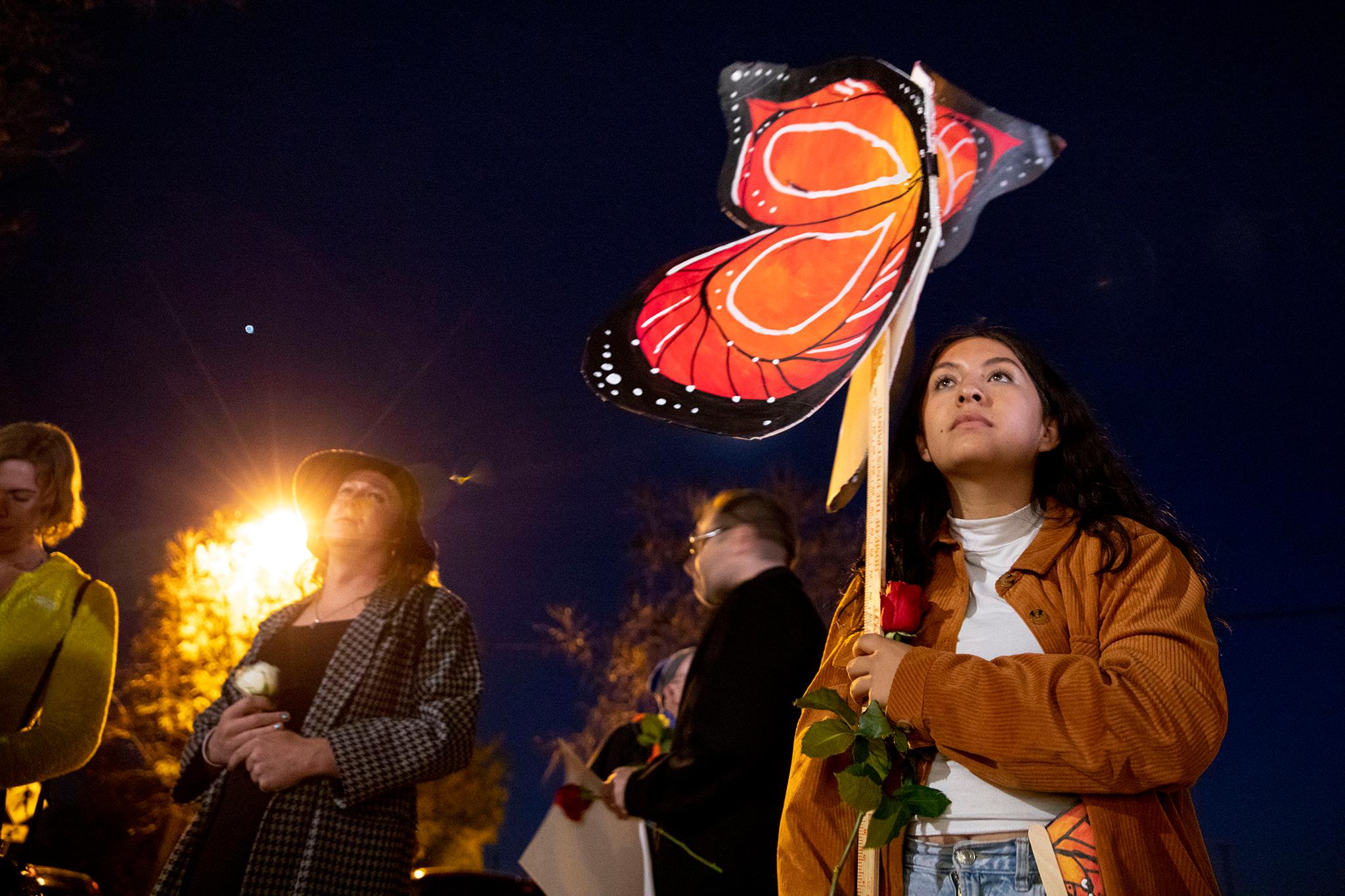
Updated Oct. 3, 2022 at 12:37 p.m.
Alondra Gil-Gonzalez bowed her head and listened as a group gathered outside the Aurora GEO ICE detention facility to read the names of inmates aloud. She’d attended vigils like this in the past. But this year, one name in particular made her start to cry.
“Melvin Ariel Calero Mendoza,” an attendee shouted.
“Presente,” the crowd said in unison.
Calero Mendoza died in October while in the custody of U.S. Immigration and Customs Enforcement, or ICE. In the weeks since, family members, activists and politicians have demanded accountability and answers for questions surrounding the 39-year-old’s passing. Calero Mendoza was the facility's third death since 2012. The most recent death prior to his was in 2017.
On Wednesday night, supporters gathered outside ICE’s detention center to honor Calero-Mendoza as part of an annual Día de los Muertos remembrance focused on immigrants who have died while incarcerated. Attendees held signs plastered with his face and prayed for his family and two children.
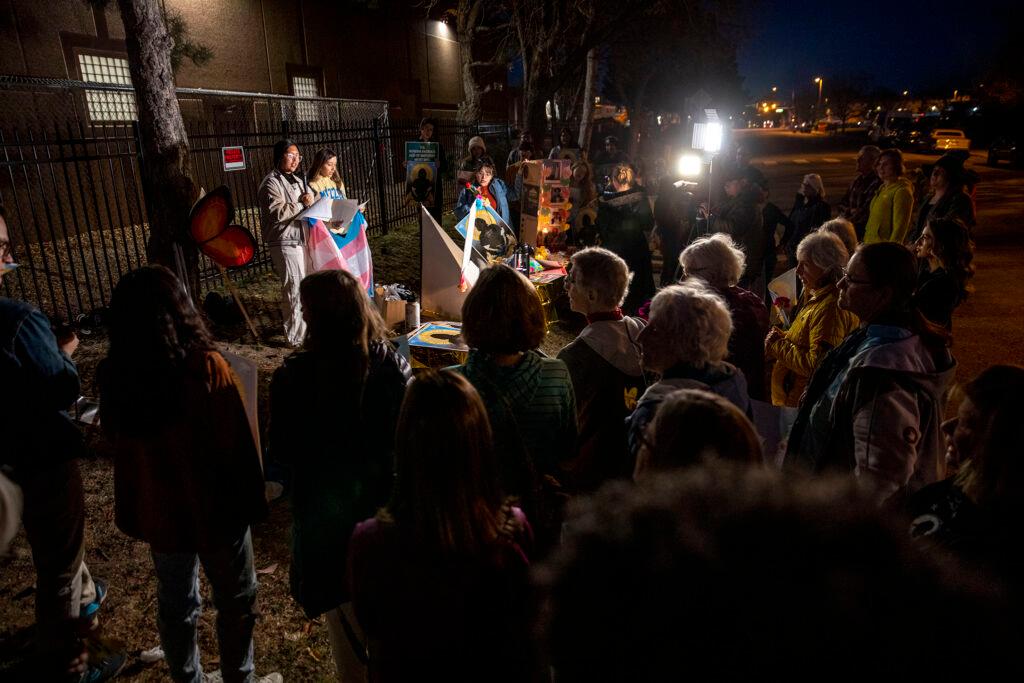
Gil-Gonzalez, a student at Regis University in Denver, said Calero Mendoza's story made her think of her own parents. They moved to the United States from Mexico before she was born.
“It could be any single one of them in those walls being treated like this,” Gil-Gonzalez said. “It’s just not fair that people are having to be in such horrible conditions and be afraid of dying one day just because they want to experience this American dream.”
Many at the vigil expressed frustration with the lack of public information about Calero Mendoza’s death. Speakers demanded authorities release more details about his time in custody and his autopsy report.
“This is unacceptable,” said Gabriela Flora, a volunteer with the American Friends Service Committee (AFSC), a charity that works with the families of inmates who die or are injured while in ICE custody, including Calero Mendoza’s. “No one should be dying in detention. No one should. And we need to get to the bottom of this.”
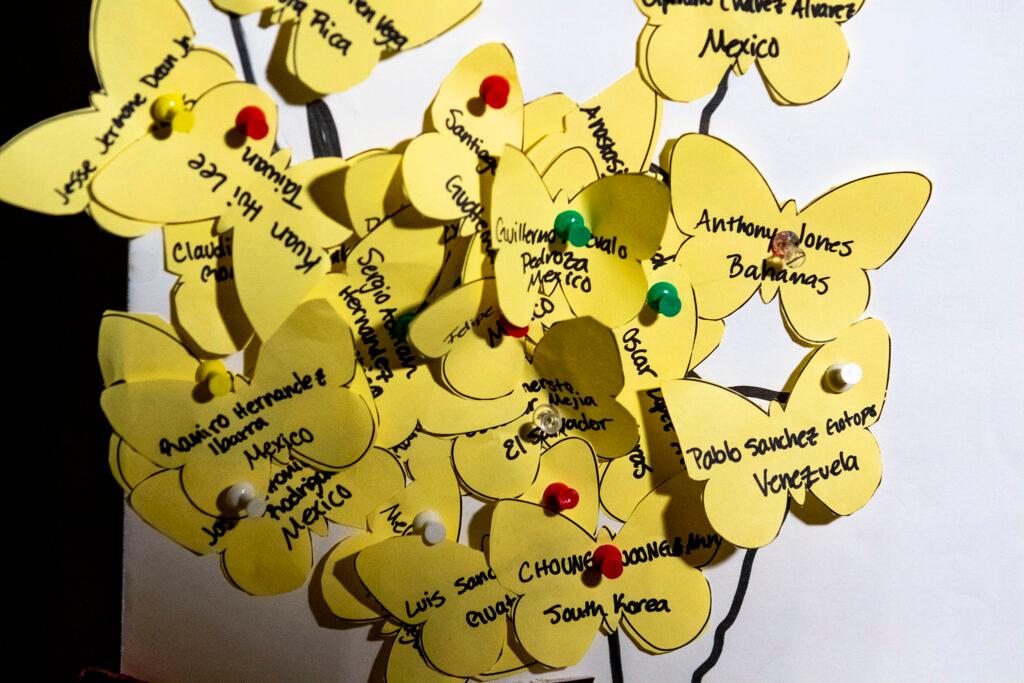
Information from ICE has been limited.
Calero Mendoza first came in contact with U.S. Border Patrol agents in April, according to the agency’s only statement about the case.
ICE transferred him to detention in Aurora in May. He then received a deportation order from a federal judge on Oct. 5.
Then, on Oct. 13, he was transferred to the University of Colorado Hospital in Aurora, where he died. An official cause of death has not been released.
“ICE is firmly committed to the health and welfare of all those in its custody and undertaking a comprehensive agency-wide review of this incident, as it does in all such cases,” the agency said. “Fatalities in ICE custody, statistically, are exceedingly rare and occur at a fraction of the national average for the U.S. detained population.”
Family members, through AFSC, declined an interview request, citing safety concerns and the ongoing investigation.
Calero Mendoza left his home in Nicaragua earlier this year to seek employment and economic opportunity. All of his immediate family, including his two children, still live there, said Jennifer Piper, Colorado program director of the AFSC.
“His loved ones are now focused on making sure an investigation is complete and figuring out how to get his remains back to Nicaragua,” Piper said. “It’s a heartbreaking situation.”
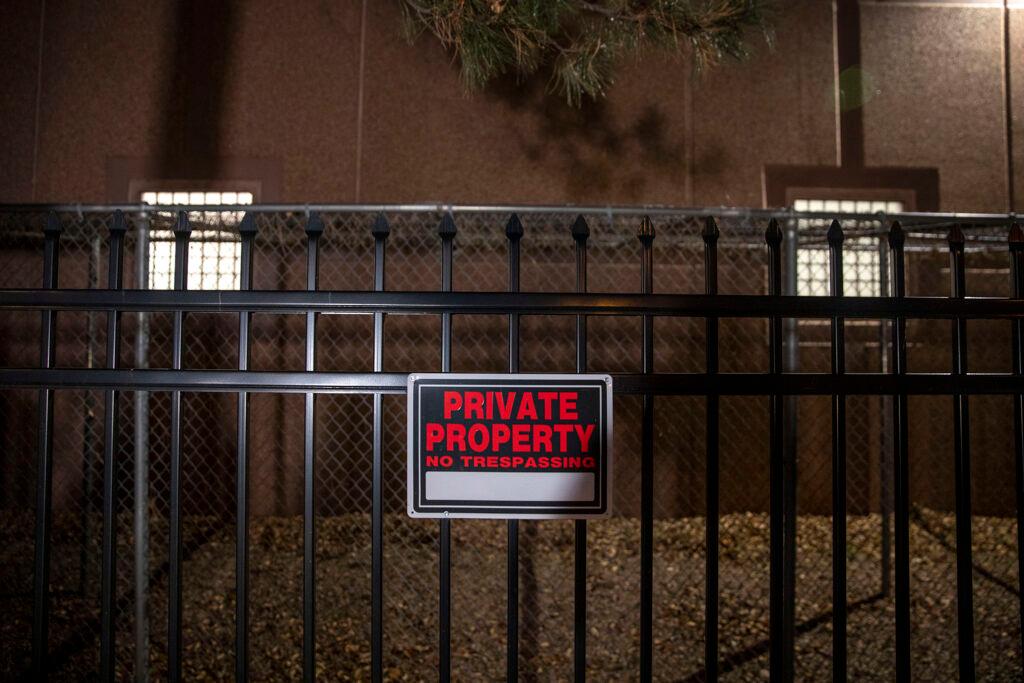
The case has drawn scrutiny from Colorado’s congressional delegation.
Democratic Rep. Jason Crow joined senators Michael Bennet and John Hickenlooper to request an independent investigation into Calero Mendoza’s death.
In a letter to the Inspector General’s Office, they also suggested increasing oversight of the Aurora facility, which houses roughly 1,500 detainees and is run by GEO Group, a private prison company contracted by ICE. The congressmen cited COVID-19 outbreaks and other reported injuries in recent years.
The company, which operates more than 100 facilities across the country, is also facing a class-action lawsuit accusing it of poor conditions and forced labor.
In a statement, GEO rejected any claims of poor medical care at its Aurora facility.
“We are fully cooperating with our client, U.S. Immigration and Customs Enforcement (ICE), as this matter is fully reviewed,” a spokesman said. “The health and safety of all those in our care and our employees have always been our number one priority.”
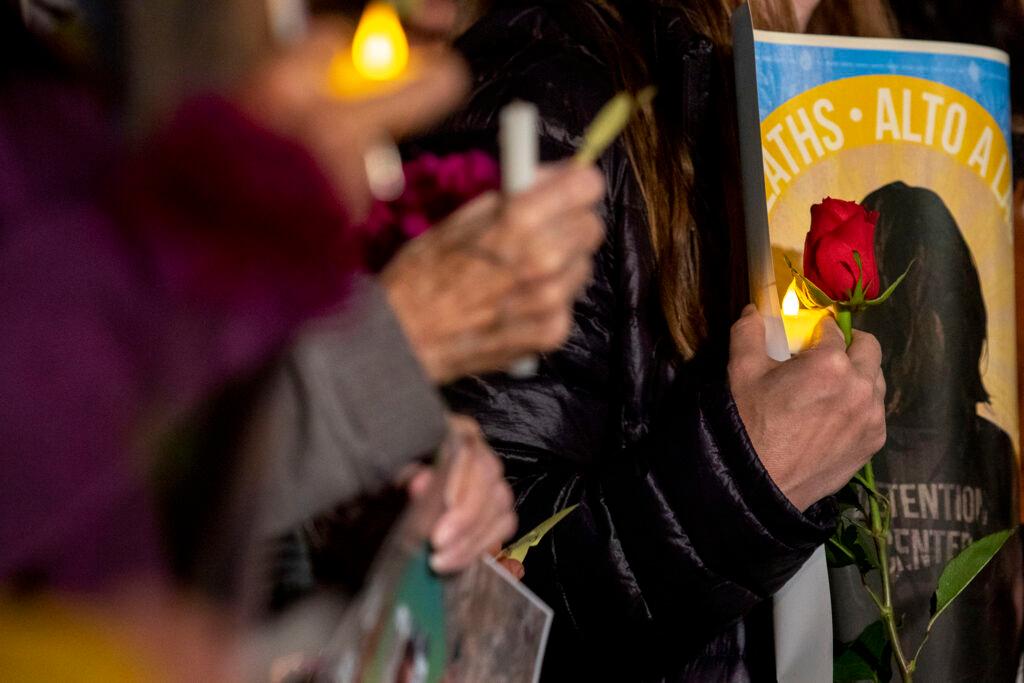
‘The only thing that we as immigrants are asking for is an opportunity’
Attendees at Wednesday’s vigil said Calero Mendoza’s case reminded them of the last death reported at the Aurora facility in 2017. Kamyar Samimi died from a cardiac arrest triggered by untreated opioid withdrawal, according to an ACLU account of the incident.
Guadalupe Lopez held a candle as she spoke about her and her husband’s experience being detained inside the facility after they were pulled over for speeding in 2012. The experience was the most stressful of her life, she said.
“We have five children that are U.S. citizens and it affected them a lot,” she said. “I know that there are a lot of mothers within these walls that are going crazy just thinking of what is happening with their little ones.”
Lopez appealed a deportation case against her. Eventually, she applied for citizenship and was released.
She related to Calero Mendoza's story and said she hoped people viewed him as someone who dreamt of making life better for his family.
“I think people need to understand that the only thing that we as immigrants are asking for is an opportunity,” Lopez said through a translator. “It’s not necessary to have us incarcerated in these four walls. What I'd like is for more people to get involved and to take action so that someday soon we can close the center because it's not healthy for anyone.”
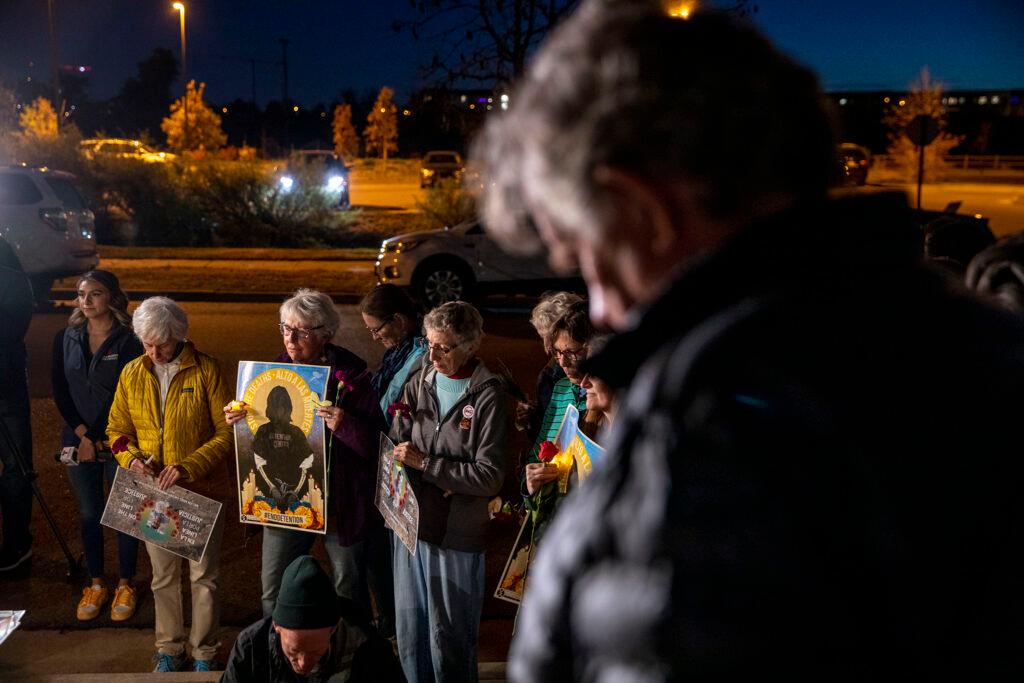
At the end of the vigil, the group faced the detention center’s walls and sang, hoping inmates inside could hear them. Volunteers passed out postcards in the shape of butterflies. On each one, they wrote the name of a person who had died or was injured while in ICE custody.
They then placed those notes on an altar featuring a map of the world. Each butterfly was pinned to the home country of the name it bore.
Flora, the volunteer from AFSC, placed a butterfly in Nicaragua with the name of Melvin Ariel Calero Mendoza.
“We must not only find out what happened but hold people accountable,” she said. “Because it’s not okay.”
Editor's Note: This story has been updated to correct a misspelling of Gabriela Flora's name.









